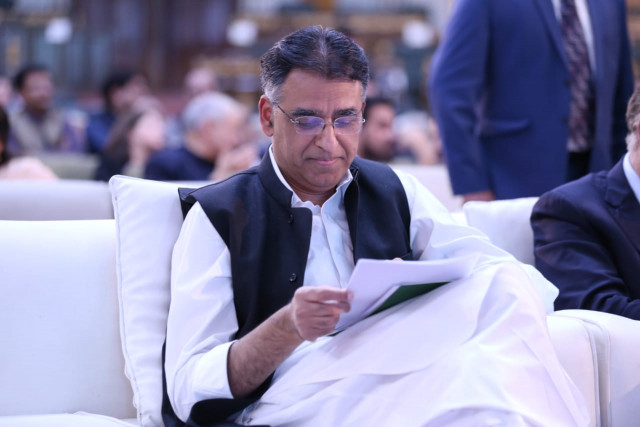Imran Khan-led govt chastises Pakistan Bureau of Statistics for faulty inflation reading
It reported 9.4% inflation, which was 1.2-percentage-point higher than actual level

Finance Minister Asad Umar. PHOTO: PTI
The PBS reported 9.4% inflation in March, which was at least 1.2 percentage points higher due to application of a wrong methodology, Finance Minister Asad Umar told The Express Tribune after a meeting of the Economic Coordination Committee (ECC) of the cabinet.
The ECC took presentation on inflation after the national data collecting agency reported that the Consumer Price Index (CPI)-based inflation jumped to a five-year high at 9.41%.
The wrong calculation of inflation numbers carries serious consequences for the economy as one of the considerations for determining the policy rate by the central bank is the inflation level. The State Bank of Pakistan (SBP) on Friday increased the discount rate by 50 basis points to 10.75%, though core inflation had gone down.
The decision to increase the interest rate despite deceleration in the core inflation was also surprising, giving rise to suspicion that the central bank increased the rate to qualify for an IMF loan programme.
Expressing displeasure over the poor presentation given by the PBS, the ECC constituted a body to look into the inflated inflation reading. The sub-committee would review all aspects related to inflation and give its report to the prime minister on Monday, said the finance minister.
The Pakistan Tehreek-e-Insaf (PTI) government had increased electricity and gas prices for certain categories of consumers, but the PBS applied the increase to all categories that pushed inflation above its actual reading.
The government had directed the PBS to review its methodology about three months ago, but the PBS did not comply with the order.
However, the responsibility of poor performance of the PBS falls on the PTI government that has failed to appoint competent members in the national data collecting agency. There is also no chief statistician in the bureau.
An official statement of the finance ministry stated that the Statistics Division gave a presentation to the committee about inflation and prices of various items in the country.
It was decided to constitute a sub-committee, under the chairmanship of the minister for national food security and research, to review the supply and demand of essential food items in order to ensure stable prices in the country. The Industries and Production Division briefed the ECC about the availability of urea in the country. In order to facilitate farmers and meet their demand, the ECC approved immediate import of 100,000 tons of urea.
Besides, it decided to allow additional import of urea in the event of any demand-supply gap. The committee directed the Ministry of Industries to review the price mechanism of the fertiliser industry to ensure provision of urea to the farmers at cheaper rates.
It directed the relevant institution to check market manipulation activities in the fertiliser sector and use all its powers under the law to penalise such behaviour.
Moreover, the committee was apprised by the Industries Division of the status of National Accountability Bureau (NAB) cases against seven persons involved in corruption in Pakistan Steel Mills (PSM). The Interior Division informed the meeting that names of the seven persons had been recommended to the federal cabinet for placement on the Exit Control List (ECL).
In February, the ECC had directed that names of people allegedly involved in Rs7-billion corruption in PSM should be placed on the ECL. The Ministry of Industries had told the ECC that 10 PSM cases were pending before NAB, involving an amount of Rs7 billion. A majority of the cases were from the period when Mueen Aftab Sheikh was the chairman and chief executive officer of PSM, according to the ministry’s briefing.
These cases were more than 10 years old and the ECC urged NAB to expeditiously decide the cases. In certain cases, NAB has filed a supplementary reference in the Accountability Court, Karachi.
The accused include former chairman, former chief executive, former directors and officials of PSM, and officials of Abbas Steel Mills and other trading companies that did business with PSM.
The mill has remained closed for the last over three years and the government is currently in the process of preparing a revival plan with the help of private sector.
The committee accorded approval to a proposal for a fuel supply agreement between PSO and State Oil Company of Azerbaijan (SOCAR).
Published in The Express Tribune, April 4th, 2019.
Like Business on Facebook, follow @TribuneBiz on Twitter to stay informed and join in the conversation.



















COMMENTS
Comments are moderated and generally will be posted if they are on-topic and not abusive.
For more information, please see our Comments FAQ